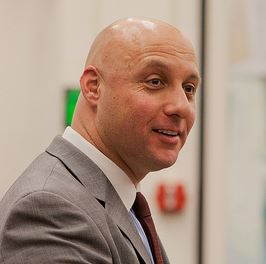My 85-pound pit bull lives better than most people on this planet do. He gets water every day, and not just any old tap water. He gets reverse-osmosis filtered water. He doesn’t eat just plain, run-of-the-mill dog food. He gets high-end dog food and, sometimes, he even gets to eat the same organic beef and chicken that my family and I eat for dinner.
This dog gets better medical care than most humans.”]
Not only does he drink high-quality water every day and eat good meals — he also gets supplements. He takes fish oil for his skin and coat, joint supplements, and canine multivitamins. This dog gets better medical care than most humans. He sees the veterinarian once a year for his annual physical, and if he ever gets sick, he receives medical care that same day or the next at the latest.
Moreover, this dog doesn’t just sleep on the floor under a roof in a warm house (or air-conditioned if it’s summer). He sleeps on a specially designed orthopedic bed. So, to reiterate, each and every day, this dog eats superior food, drinks clean water, and sleeps inside a comfortable house on a comfortable bed.In 2016, Americans spent $66.75 billion on pets.”]
These days, large stores and fashion accessories in wealthy countries aren’t just for people. Just drive around and you’ll see stores like Petco, Pet Club, or Pet Smart, all catered to the modern pampered pet. In 2016, Americans spent $66.75 billion on pets, primarily for food, supplies, and veterinary services. Many dogs in the United States travel inside designer bags that are worth more than some people live on in an entire year.Economic Freedom
Why do I share these details about my dog and the pet industry? Because, unfortunately, this is not the case for most human beings. As an economics professor, I want my students to perceive the disparity between living standards in the United States and many other parts of the world. I want them to understand why it is that I can afford to take such good care of my dog. Why is it that many other Americans can do this, and even more, for their pets?
Why is it that many other Americans can do this, and even more, for their pets?”]
The answer is economic freedom. Every time I see pet-store commercials, drive past a veterinary clinic, or notice a dog wearing a sweater or being carried inside a designer bag, I am reminded of the beauty and power of capitalism.
When people think of freedom, they usually think of freedom of the press, freedom of speech, and the freedom to choose politicians by voting. However, even in countries where these freedoms are established, the standard of living is sometimes very low for its citizens. In my view, economic freedom is even more important than political freedom because it can raise the standard of living of the people. Economic freedom includes the right to own property, a limited government that enforces contracts, and the freedom to buy and sell goods and services.
However, there are many countries where people are suffering because the rules of the game — institutions — lead to perverse incentives. As economist Robert Lawson puts it:When governments substitute taxes, government expenditures, and regulations for personal choice, voluntary exchange, and market coordination, they reduce economic freedom. Restrictions that limit entry into occupations and business activities also reduce economic freedom.”]
The Rules of the Game
For a country to prosper, the institutions have to be right. Individuals who live in a county with secure property rights have the security to create new businesses. Profits offer businessmen the incentive to produce. And a country that doesn’t tax away the fruits of an entrepreneur’s labor creates an incentive to innovate in that country. Economic freedom means that the business owner doesn’t have to jump through hoops or deal with cumbersome rules and regulations to run his or her business.
Profits offer businessmen the incentive to produce.”]
In my economics classes, I stress to my students that the institutions — the rules of the game — are the most important factor for economic prosperity. I show them the famous NASA evening satellite image of North and South Korea, where South Korea is lit up and North Korea is almost completely dark. It’s a perfect case study in comparative institutions. The two countries are very similar except for their institutions (economic systems).
So, why is economic freedom not embraced by more people? Perhaps the promises of a “living wage,” “free” healthcare, and “free” education sound too appealing. Perhaps when people hear that the best system is one that allows the freedom to succeed but also the freedom to fail, it sounds too harsh and heartless. A government that “protects” its citizens from economic hardship sounds more secure and civilized. Or perhaps it is economic ignorance and a lack of sound economics education that leads to people being skeptical of economic freedom.
My duty as an economics professor is to not only teach students about fundamental concepts such as scarcity, opportunity cost, and the law of diminishing marginal utility, or graphs like supply and demand, but also to get them to think about why some countries are wealthy while others are extremely poor. Students need to learn that institutions matter.
Economics professors should be creative and use relevant examples when teaching economics. Moreover, they should take pains to emphasize to students the importance of institutions and how economic freedom is what allows individuals to avoid suffering and starvation and how economic freedom leads to greater wealth. It is this increase in wealth that enables individuals to not only buy groceries for their family or medicine for their children but also to own pets and buy those pets high-end pet food, toys, outfits, supplements, and special beds.



